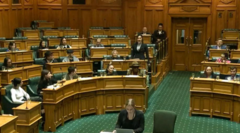The French National Assembly has passed a significant bill enabling assisted dying for certain terminally ill patients, thereby positioning France as a potential key player in the assisted dying landscape across Europe.
French Parliament Approves New Law for Assisted Dying

French Parliament Approves New Law for Assisted Dying
French lawmakers vote to permit assisted dying for terminally ill patients amid ongoing ethical discussions.
Magistrates in the French National Assembly have recently approved a law that would allow individuals battling terminal illnesses to opt for assisted dying. The bill received a favorable vote of 305 to 199, indicating substantial support, particularly from President Emmanuel Macron. It will now proceed to the Senate for further deliberation before returning to the National Assembly for a subsequent reading, with hope pinned on its final passage by 2027. If enacted, France would join seven other European Union nations that currently accommodate some form of assisted dying.
The legislation, however, is less permissive compared to the protocols established in the Netherlands and Belgium, which were pioneers in this legal domain. An additional bill aimed at safeguarding the right to palliative care also advanced without opposition, revealing the stark disparity in access, with estimates suggesting that nearly half of French patients needing palliative care do not receive it.
President Macron characterized the legislative approval as an "important step" in society's evolution, acknowledging the sensitive nature of the subject. On his social media platforms, he expressed optimism about the advancements in social fraternity represented by the approved measures.
Discussions during the two-week legislative debate significantly focused on defining eligibility for assisted dying. The current criteria specify that individuals who suffer from "serious and incurable diseases," categorized as "life-threatening" and in "advanced or terminal phases," may qualify. Moreover, patients would need to express their intention clearly, wait a minimum of 48 hours, and reconfirm their decision. Following authorization, the lethal dose can be self-administered, or administered by a healthcare professional if necessary, with doctor oversight mandated after peer consultations.
Despite showing strong backing from center and left factions, the bill faced notable opposition from conservative and far-right parties. Critics, echoing concerns from traditionalist institutions such as the Catholic Church, argue that the allowances outlined in the bill are excessively broad, potentially enabling assisted dying for patients who still have significant time left to live. There has also been apprehension over the risk of vulnerable populations feeling pressured to opt for assisted dying due to the burdens they may impose on families.
Demonstrators gathered outside the National Assembly to voice their opposition, with one woman suffering from Parkinson's disease expressing the bill's implications as akin to a "loaded pistol left on my bedside table." On the left side of the political spectrum, some proponents have called for expanded access to include minors, non-nationals, and patients who prepare advance directives.
Healthcare professionals with conscientious objections to assisted dying would not be obligated to participate in the procedure, although any attempt to prevent it could incur a two-year prison sentence. Attempts to introduce penalties for "incitement to assisted dying" were rejected by the assembly, revealing a contentious atmosphere surrounding the bill's provisions.
Prime Minister François Bayrou, a self-identified Catholic, stated that he would personally abstain if permitted to vote on the bill, although his current position does not allow for a vote as he is not an assembly member. As the national discourse around assisted dying continues to evolve, the French legislation may set a new precedent in the delicate balance between individual rights and ethical considerations.
The legislation, however, is less permissive compared to the protocols established in the Netherlands and Belgium, which were pioneers in this legal domain. An additional bill aimed at safeguarding the right to palliative care also advanced without opposition, revealing the stark disparity in access, with estimates suggesting that nearly half of French patients needing palliative care do not receive it.
President Macron characterized the legislative approval as an "important step" in society's evolution, acknowledging the sensitive nature of the subject. On his social media platforms, he expressed optimism about the advancements in social fraternity represented by the approved measures.
Discussions during the two-week legislative debate significantly focused on defining eligibility for assisted dying. The current criteria specify that individuals who suffer from "serious and incurable diseases," categorized as "life-threatening" and in "advanced or terminal phases," may qualify. Moreover, patients would need to express their intention clearly, wait a minimum of 48 hours, and reconfirm their decision. Following authorization, the lethal dose can be self-administered, or administered by a healthcare professional if necessary, with doctor oversight mandated after peer consultations.
Despite showing strong backing from center and left factions, the bill faced notable opposition from conservative and far-right parties. Critics, echoing concerns from traditionalist institutions such as the Catholic Church, argue that the allowances outlined in the bill are excessively broad, potentially enabling assisted dying for patients who still have significant time left to live. There has also been apprehension over the risk of vulnerable populations feeling pressured to opt for assisted dying due to the burdens they may impose on families.
Demonstrators gathered outside the National Assembly to voice their opposition, with one woman suffering from Parkinson's disease expressing the bill's implications as akin to a "loaded pistol left on my bedside table." On the left side of the political spectrum, some proponents have called for expanded access to include minors, non-nationals, and patients who prepare advance directives.
Healthcare professionals with conscientious objections to assisted dying would not be obligated to participate in the procedure, although any attempt to prevent it could incur a two-year prison sentence. Attempts to introduce penalties for "incitement to assisted dying" were rejected by the assembly, revealing a contentious atmosphere surrounding the bill's provisions.
Prime Minister François Bayrou, a self-identified Catholic, stated that he would personally abstain if permitted to vote on the bill, although his current position does not allow for a vote as he is not an assembly member. As the national discourse around assisted dying continues to evolve, the French legislation may set a new precedent in the delicate balance between individual rights and ethical considerations.






















